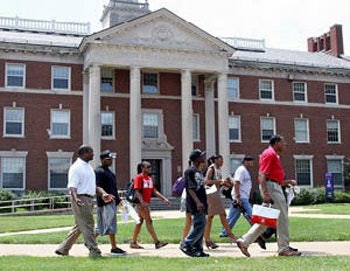Advocates of historically Black colleges and universities shout about the need to keep these schools open, despite flailing finances and declines in student enrollment. One of the biggest arguments for saving these schools is this: each has its own unique heritage that is valuable to the college landscape and society as a whole. There aren’t many people demanding that struggling HBCUs stay open because of their academic merit alone, or because they are the only spots to adequately educate minority students (because they simply aren’t anymore).

In this article, I will discuss three trends that struggling HBCUs must embrace to remain viable in an ever-evolving higher education landscape.
Embrace technology. Technology is important and certainly an integral part of nearly every contemporary career—and students at HBCUs should never feel like they are sacrificing technological resources when they choose an HBCU over a competing institution. Consider the historical relevancy of HBCUs when it comes to STEM learning areas. Thirty-one percent of all Black mathematicians and biological scientists have graduated from HBCUs and 42 percent of agricultural scientists who are Black. This is a foothold HBCUs have developed over time—and one they should cling to for survival. College-level technology, at the very least, should include remote learning opportunities and should escalate to cutting-edge equipment in classrooms. HBCUs should not be content to simply graduate innovators; they should be places where the innovation is taking place.
This takes resources, of course, and constant cash flow to stay current. For HBCUs already struggling to stay afloat, technology can be a stretch to an impossibility. Keeping the community aware of donation and technology needs at the HBCU must be made a priority. HBCUs should take advantage of the simple technology available—through social media, email, and even text notification communication—to spread the word about their technology needs and have them met. Funding should be prioritized for technology initiatives, and their importance should be recognized.
Embrace diversity. HBCUs should also continue to embrace a spirit of diversity, particularly outside its traditional student body demographic. Black students should not make up the entire student body—or even a majority of it. Students from all ethnic and socioeconomic backgrounds should be welcomed in. The first-generation college students are looking to elevate their family status. The student immigrants who are still assimilating into U.S. culture. The underdogs from every race, creed, and color who need that extra bit of encouragement in a close-knit environment to accomplish their educational aspirations. It is this pool of students who have the highest potential to be innovators and to step outside their comfort zones to build a better future for themselves and our country. HBCUs can play that pivotal role in getting these students to that point and boost their enrollments at the same time.
Embrace affordability. For HBCUs to stay viable, they have to be more affordable. Telling young Black college students to have their parents “write a check” for their education just isn’t going to fly. Asking them to take on heavy loads of debt is also a no-go. The students entering college today have the advantage of their not-so-much-older graduated peers who are more vocal than any other group in the past about why college attendance needs to be more affordable.
It makes sense. No one feels the squeeze of what college costs than the students who are living it and the young adults attempting to pay back high amounts of college debt on low salaries. Today’s college students saw their parents struggle through the latest recession. Some may have even lost homes. They are well aware of what the load of college debt means. This is why it is imperative that HBCUs offer affordable options to students from all life backgrounds. Today’s college students want to attend an institution that recognizes the significant financial sacrifice of earning a degree and takes steps to make their tuition affordable.
In today’s ever-evolving higher education landscape, institutions of all kinds must embrace change to remain viable. This applies to all institutions, but it is particularly the case for HBCUs, which have been traditionally marginalized and, more importantly, underfunded. For HBCUs to weather the storm that is brewing in higher education, they must embrace the three trends that were discussed in this article.
Matthew Lynch is a higher education consultant and owner of Lynch Consulting Group, LLC. He currently resides in Richmond, Virginia.















